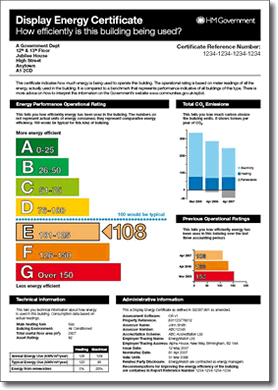You will have heard about Energy Performance Certificates (EPCs) and the full roll out that finished on the 1st October. Anyone involved in domestic or non domestic property will come across them in some capacity. However, in amongst all the legislation in the regulations there is another requirement that may take some by surprise.
 From 1st October 2008 all public sector buildings, which are non dwellings, with public access and above 1,000 square meters will need to have a valid Display Energy Certificate, or DEC. Council offices would need one, leisure centres would need one, hospitals would need one, a large school may need one, but only if it is publically owed and has public access. No private building is required to have a valid DEC, although there is nothing to stop someone having one on a voluntary basis.
From 1st October 2008 all public sector buildings, which are non dwellings, with public access and above 1,000 square meters will need to have a valid Display Energy Certificate, or DEC. Council offices would need one, leisure centres would need one, hospitals would need one, a large school may need one, but only if it is publically owed and has public access. No private building is required to have a valid DEC, although there is nothing to stop someone having one on a voluntary basis.
There are two elements to a DEC. The first is the Certificate. This is an annually renewable document which is based on the analysis of the building utility bills. The other is an Advisory Report which is based on an inspection and is valid for up to seven years. It is a legal requirement to display the Certificate at all times, such as in a public reception area, and to have an accompanying valid Advisory Report available to be produced if requested by anyone who asks for it. Failure to have both elements of a valid DEC in your possession can result in fines.
Read the rest of this entry »





 You will have heard of the residential Energy Performance Certificates or EPCs that were instituted last year as part of the Home Information Pack legislation, but did you know that there is a Commercial Energy Performance Certificate that is currently being rolled out?
You will have heard of the residential Energy Performance Certificates or EPCs that were instituted last year as part of the Home Information Pack legislation, but did you know that there is a Commercial Energy Performance Certificate that is currently being rolled out?